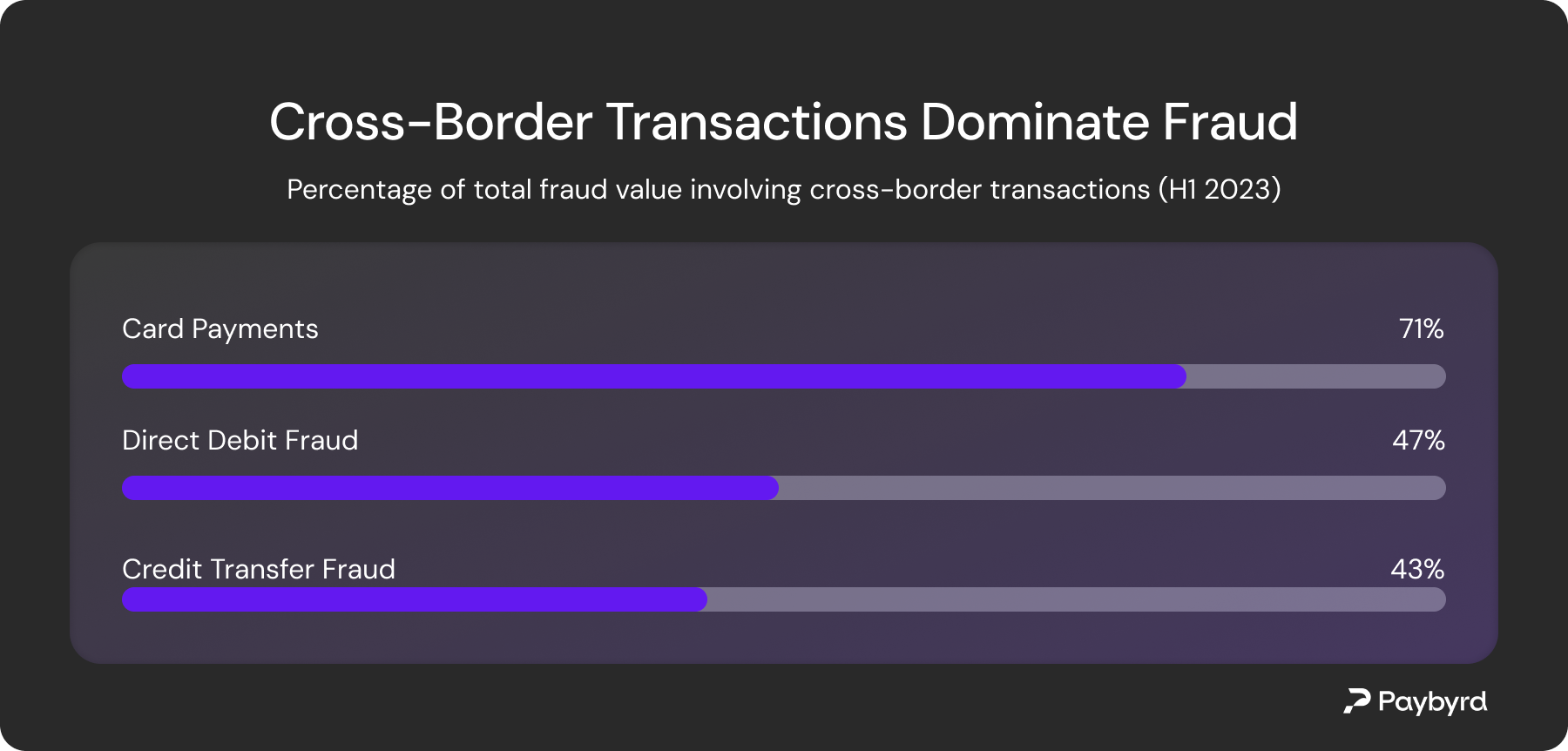The €4.3B Fraud Crisis Hitting Benelux: Why Payment Security Can't Wait
Overview
.png)
The Netherlands now ranks highest among all European Economic Area countries for digital payment fraud volume, fraud rates, and total losses. With €4.3 billion in fraudulent payments across Europe in 2022 and cross-border fraud rates ten times higher than domestic transactions, the Benelux region faces an escalating crisis that demands immediate executive attention. For enterprise and mid-market businesses, fraud prevention has evolved from a compliance checkbox to a strategic imperative that directly impacts profitability and customer trust.
The regulatory landscape is shifting rapidly, with mandatory IBAN-name matching arriving October 2025 and new liability frameworks reshaping risk allocation. Here's how smart businesses are turning fraud prevention into competitive advantage.

The Hidden Scale of Benelux Fraud: Numbers That Demand Action
.png)
The Benelux region's digital advancement has created an unexpected vulnerability. Despite sophisticated payment infrastructure, 61% of anti-fraud leaders at Belgian and Dutch banks reported increased fraud attempts in 2024, with 58% experiencing corresponding rises in annual losses.
The cross-border problem is particularly acute. Fraud rates for card payments are ten times higher when counterparts are located outside the EEA, primarily because Strong Customer Authentication requirements don't apply to these transactions. This regulatory gap has created a massive vulnerability that fraudsters actively exploit.
The scale is staggering: 71% of card fraud value in the first half of 2023 involved cross-border transactions, while 43% of credit transfer fraud and 47% of direct debit fraud occurred across borders. Estimates indicate $194.9 billion in illicit funds moved in or out of European countries in 2023.
For businesses operating in this environment, the financial impact extends far beyond direct losses. The average cost of fraud includes investigation expenses, chargeback fees, operational disruption, and reputational damage that can persist long after the initial incident.
The New Fraud Playbook: Why Traditional Defenses Are Failing

Modern fraudsters have abandoned crude tactics in favor of sophisticated approaches that exploit both technology and human psychology. The shift from traditional data theft to social engineering represents a fundamental change in the threat landscape.
Authorized Push Payment (APP) Fraud: The New Frontier
APP fraud has emerged as one of the most damaging attack vectors, where legitimate customers are manipulated into authorizing payments to fraudulent accounts. Unlike traditional fraud where stolen credentials are used, APP fraud exploits the customer's own authorization, making detection significantly more challenging.
The sophistication of these attacks has increased dramatically. Fraudsters now use AI-generated voices for phone-based social engineering, create convincing fake websites that mirror legitimate businesses, and employ detailed reconnaissance to personalize their approaches. The rise of "friendly fraud" or first-party misuse, where legitimate customers exploit systems, further complicates detection efforts.
Cross-Border Exploitation
APP fraud has emerged as one of the most damaging attack vectors, where legitimate customers are manipulated into authorizing payments to fraudulent accounts. Unlike traditional fraud where stolen credentials are used, APP fraud exploits the customer's own authorization, making detection significantly more challenging.
The sophistication of these attacks has increased dramatically. Fraudsters now use AI-generated voices for phone-based social engineering, create convincing fake websites that mirror legitimate businesses, and employ detailed reconnaissance to personalize their approaches. The rise of "friendly fraud" or first-party misuse, where legitimate customers exploit systems, further complicates detection efforts.
Regulatory Tsunami: The October 2025 Compliance Deadline
The regulatory landscape is undergoing fundamental transformation, with new requirements that will reshape fraud prevention obligations across the Benelux region.
Verification of Payee (VoP): Mandatory by October 2025
IBAN-name matching will become mandatory for all credit transfers across the European Economic Area by October 9, 2025. This requirement fundamentally changes how payment verification works, requiring Payment Service Providers to validate payee names against IBANs before authorizing transactions.
Belgian banks have already taken the lead by implementing SurePay's VoP service, demonstrating proactive compliance. The process requires the payer's PSP to send verification requests to the payee's PSP, which validates the payee's name against their IBAN. Critically, if the verification system malfunctions, customers become eligible for refunds, creating new liability considerations for businesses.
PSD3 and PSR: Reshaping Liability Frameworks
The forthcoming Payment Services Directive 3 (PSD3) and Payment Services Regulation (PSR) will fundamentally reshape compliance obligations and liability frameworks. These regulations introduce enhanced consumer protection measures while creating new responsibilities for Payment Service Providers and merchants.
The implications extend beyond compliance costs. New liability frameworks may shift financial responsibility for certain types of fraud, making robust prevention systems not just operationally important but financially critical.
Enterprise Blind Spots:Where Fraud Prevention Fails
Despite increased awareness, enterprise and mid-market businesses continue to struggle with fundamental fraud prevention challenges that create exploitable vulnerabilities.
Resource Constraints and Omnichannel Complexity
The most significant challenge cited by merchants globally is the persistent lack of internal resources dedicated to fraud management. This resource constraint creates dangerous gaps in fraud prevention capabilities, particularly in omnichannel environments where transaction patterns span multiple touchpoints.
The complexity of modern commerce environments compounds this challenge. Businesses must monitor fraud across online channels, mobile applications, in-store transactions, and increasingly, social commerce platforms. Each channel presents unique fraud vectors that require specialized detection approaches.
The False Positive Trap
Overly aggressive fraud prevention creates its own problems. High false positive rates—where legitimate transactions are incorrectly flagged as fraudulent—can damage customer relationships and reduce conversion rates. Studies indicate that over 90% of merchants employ various methods to boost authorization rates, highlighting the delicate balance between security and user experience.
The challenge is particularly acute for businesses with international customer bases, where legitimate cross-border transactions may trigger fraud alerts based on geographic risk factors.
The Technology Arms Race: AI vs. AI
The fraud prevention landscape has evolved into a sophisticated technology battle, with both fraudsters and defenders leveraging artificial intelligence and machine learning capabilities.
Advanced Detection Technologies#
Modern fraud prevention platforms employ multiple layers of AI-driven analysis:Behavioral Biometrics: These systems analyze how users interact with devices—typing patterns, mouse movements, touch pressure—to create unique behavioral profiles. Changes in these patterns can indicate account takeover attempts or unauthorized access.
Real-Time Risk Scoring: Advanced platforms process hundreds of data points in milliseconds to assign risk scores to transactions. These systems consider device fingerprinting, geolocation analysis, transaction velocity, and historical patterns to identify suspicious activity.
Network Analysis: Sophisticated platforms analyze transaction networks to identify patterns that indicate coordinated fraud attacks. This approach can detect fraud rings and organized criminal activity that might escape individual transaction analysis.
The Tokenization Advantage
Tokenization is used by six in ten merchants to replace sensitive data with non-sensitive tokens, providing an additional security layer. However, the technology is evolving, with network tokens gaining favor over gateway tokens for enhanced security and improved authorization rates.
Vendor Landscape: Choosing theRight Fraud Prevention Partner

The Benelux market features several prominent fraud prevention vendors, each offering specialized approaches to address the evolving threat landscape.
The Center of a Fraud Prevention Hub
A unified payment orchestration platform serves as the connective layer between businesses and a diverse network of fraud prevention technologies. By integrating tools that specialize in areas such as behavioral analytics, AI-driven risk scoring, and tokenized transaction security, the platform enables merchants to benefit from advanced protection tailored to their specific operational needs.
These integrated partners bring strengths in areas like real-time fraud detection, cross-channel transaction monitoring, and compliance management across geographies. Through this ecosystem approach, the platform ensures that fraud prevention is not one-size-fits-all, but rather a modular, adaptive solution built to evolve with the complexity of modern commerce.
By centralizing access to these varied tools, the platform allows vendors to streamline operations, reduce fraud exposure, and deliver more secure customer experiences—all without needing to manage multiple disconnected systems.
How Paybyrd Transforms Fraud Prevention for Benelux Businesses
Paybyrd delivers comprehensive fraud prevention through an integrated platform designed specifically for the complexities of European payment environments:
Multi-Layered AI Detection: Advanced machine learning algorithms analyze transaction patterns, behavioral biometrics, and network relationships to identify fraud in real-time while minimizing false positives.
Regulatory Compliance: Built-in support for VoP requirements, PSD3/PSR compliance, and Strong Customer Authentication ensures businesses meet evolving regulatory obligations without operational complexity.
Cross-Border Intelligence: Specialized capabilities for detecting and preventing cross-border fraud, addressing the ten-fold higher risk rates in international transactions.
Unified Risk Management: Consolidated fraud prevention, payment processing, and compliance monitoring in a single platform eliminates operational silos while providing complete visibility into payment security.
Local Market Expertise: Deep understanding of Benelux payment preferences, regulatory requirements, and fraud patterns ensures optimal protection for regional businesses.
The Strategic Imperative: From Cost Center to Competitive Advantage
Fraud prevention has evolved from a necessary expense to a strategic differentiator that directly impacts customer trust, operational efficiency, and financial performance. Businesses that invest in sophisticated fraud prevention capabilities gain multiple advantages:
Customer Trust: Robust security measures protect customer data and financial information, building trust that translates to increased loyalty and higher transaction values.
Operational Efficiency: Automated fraud detection reduces manual review requirements while improving transaction approval rates for legitimate customers.
Regulatory Resilience: Proactive compliance with evolving regulations like VoP and PSD3/PSR reduces regulatory risk while positioning businesses ahead of competitors.
Financial Performance: Reduced fraud losses, lower chargeback rates, and improved authorization rates directly impact bottom-line performance.
The window for competitive advantage is narrowing as regulatory requirements become mandatory and fraud sophistication increases. Early adopters of advanced fraud prevention technologies will capture disproportionate benefits while late movers face increased risks and compliance challenges.
The time for action is now. With VoP requirements becoming mandatory in October 2025 and fraud losses continuing to escalate, businesses must move quickly to implement comprehensive fraud prevention strategies.Ready to transform your fraud prevention capabilities? Contact Paybyrd to discover how our integrated platform can protect your business while improving customer experience.
Ready to take it to the next level?
Start right away, or get in touch for a no-obligation free consultation with one of our knowledgeable team members.







